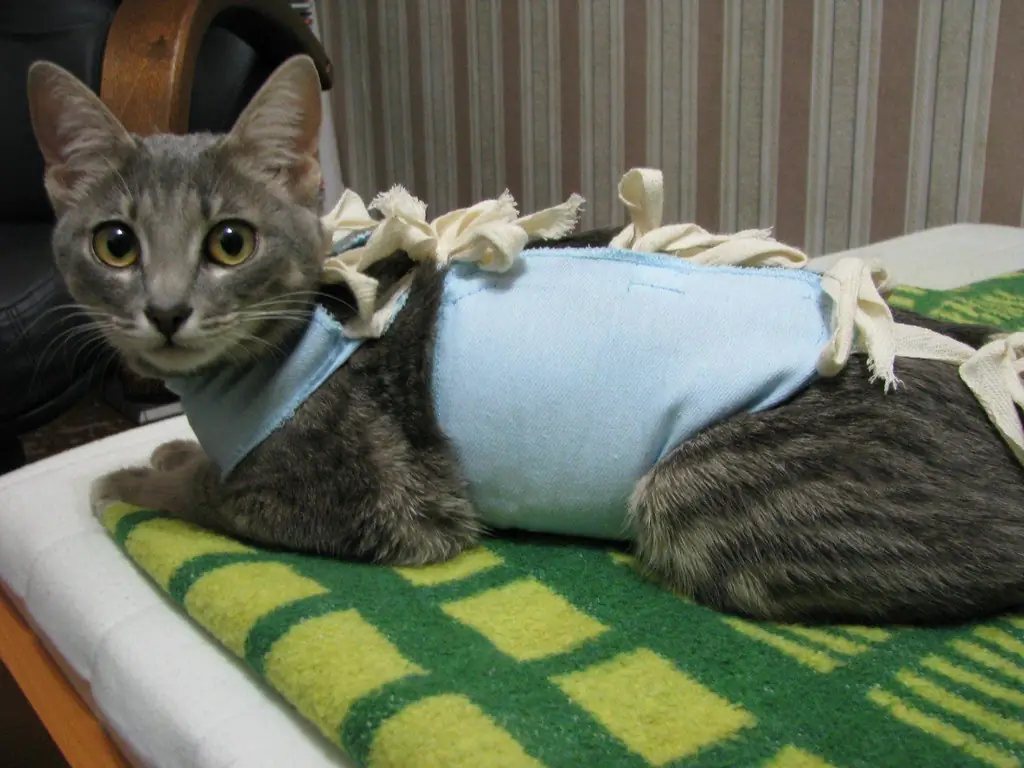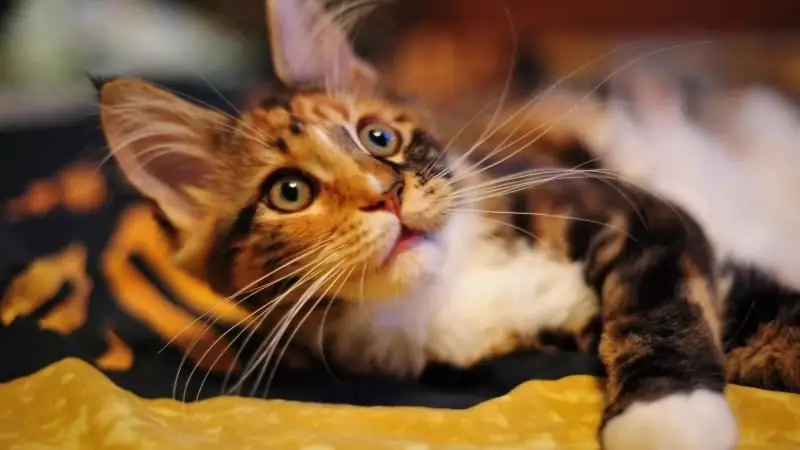
Table of contents:
- Measure seven times, or how to decide to castrate a cat
- What is castration and what is it for
- Pros and cons of castration - mythical and real
- Optimal age for surgery
- How does this happen
- Operation cost
- Before and after: what is required from the owner
- Castration of a cat: position of veterinarians
- Reviews of the owners of castrated cats
- Author Bailey Albertson albertson@usefultipsdiy.com.
- Public 2023-12-17 12:53.
- Last modified 2025-06-01 07:32.
Measure seven times, or how to decide to castrate a cat

Neutering cats and cats that are not used in breeding is accepted throughout the civilized world. But in our country, the attitude to such a procedure is, to put it mildly, ambiguous. Some consider it too dangerous, others - inhumane, others - both at the same time. Perhaps the problem is that we are used to arguing about subjects that we do not understand. However, before deciding to deprive your pet of its reproductive function, even if it is not destined to realize it someday, it is necessary to obtain at least elementary information about what castration is, what such an operation threatens a cat and what happens when an animal is doomed all its life suppress your sexual instincts. We will talk about all this.
Content
-
1 What is castration and what is it for
-
1.1 Castration and sterilization: what is the difference
1.1.1 Video: the difference between castration and sterilization
- 1.2 Why castrate a cat
-
-
2 Pros and cons of castration - mythical and real
- 2.1 Table: the pros of castration - myths and reality
- 2.2 Table: cons of castration - myths and reality
- 2.3 Video: veterinarian on the advisability of castration
-
3 Optimal age for surgery
3.1 Video: at what age is it better to castrate a cat
-
4 How it happens
- 4.1 Anesthesia
-
4.2 Technique of the operation
4.2.1 Table: methods of performing castration
- 4.3 Final stage
- 4.4 Cryptorchidism and features of the castration of cryptorchids
- 5 Cost of surgery
-
6 Before and after: what is required from the owner
- 6.1 Preparation for surgery
-
6.2 Postoperative period
- 6.2.1 Coming out of anesthesia
- 6.2.2 Video: cat after anesthesia
- 6.2.3 Wound care
- 6.2.4 Psychological adaptation
- 6.3 Features of caring for a castrated cat
- 7 Castration of a cat: position of veterinarians
- 8 Reviews of the owners of neutered cats
What is castration and what is it for
There is some controversy over the etymology of the word castration, but it probably comes from the Latin castrare - to castrate. Today, this term is used to denote the removal of reproductive organs (gonads) in humans or animals, as a result of which the ability to reproduce offspring is completely and irreversibly lost. As a rule, we are talking about males, although this concept is also applicable to females.
Castration and sterilization: what's the difference
Since sterilization (from the Latin sterilis - sterile) also means the deprivation of an animal's sexual function, and most of the definitions found in the literature deciphers sterilization precisely as the surgical removal of reproductive organs - the ovaries in the female and the testes in the male, it is not surprising that many do not understand the difference between castration and sterilization …
There is an opinion among ordinary people that cats are castrated, and cats are sterilized, however, as already mentioned, this is not entirely true. Sterilization involves the deprivation of the animal's reproductive capacity while maintaining all the genital organs (in the female, the fallopian tubes are simply ligated, and in the male, the seminal ducts), while castration involves the physical removal of the latter.
A sterilized cat lives a full life, nothing changes in its body and behavior, it does not lose the reproductive instinct and can even perform a normal sexual intercourse, but conception does not occur.

Sexual instincts are fully preserved in sterilized cats
The same is the case with a spayed cat. In the case of castration, the animal is not attracted to the opposite sex and is not capable of intercourse. At least in theory.
I have seen how neutered cats, having survived the operation in adulthood, "habitually" attached themselves to the females and made very characteristic gestures that imitate sexual intercourse. Some breeders claim that erectile males, previously heavily used in breeding programs, retain the ability to erect and may even mate with a cat. This behavior of the male can be caused by an excess of male hormones in the animal's body, which do not disappear immediately after castration, but over time, the cat's interest in individuals of the opposite sex gradually fades away.
Video: the difference between castration and sterilization
The answer to the question of which is better - castration or sterilization - is quite simple if you know what task the owner sets for himself.
Why castrate a cat
The neutering of animals pursues two completely independent goals:
- prevent uncontrolled reproduction (relevant both for pets and for stray cats and dogs);
- get rid of the inconvenience that the manifestations of the sexual instinct, especially the unrealized one, cause to the animal itself, as well as to its owners (hysterical screams, the habit of marking territory, an unpleasant smell in the house, etc.).
It should also be noted that the lack of an active sex life in a fertile animal is very detrimental to its health. This is fraught with the development of various diseases of the genitourinary system, inflammatory processes in the body, malignant neoplasms, etc. The mental state of the beast also suffers from forced abstinence. It is generally accepted that, first of all, these problems are characteristic of cats, but such "celibacy" is also not good for cats.

Unrealized sexual instinct is harmful to the health of the cat
Sterilization solves only one of the problems mentioned above - to prevent unwanted offspring. Moreover, if in relation to a cat it is still possible to speak about the advisability of such a half-hearted decision (especially when the animal has the opportunity to contact representatives of the opposite sex, and its owners are faced with the real problem of "arranging the fate" of numerous kittens), then with a cat in this regard, the situation is much simpler: How many females will be pregnant after communicating with an alpha male who went for a walk, the owners of such a macho, by and large, should not worry. But if the cat is domestic and cannot realize himself “as a man”, it makes no sense to sterilize him. In this case, we can only talk about castration.
Thus, sterilization - of both cats and cats - is used extremely rarely, since depriving an animal of the ability to reproduce offspring does not relieve the animal of the sexual instinct and all the behavioral features associated with it. An unrealized sexual instinct is harmful to the health of a pet and brings a lot of additional inconvenience to its owners.
Pros and cons of castration - mythical and real
We have already partly talked about the benefits of castration, but some reservations should be made here. The fact is that sometimes owners expect more from the emasculation of their pet than this procedure can actually give. Let's take a closer look at what is worth and what should not be expected from the castration of a cat.
Table: the pros of castration - myths and reality
| Advantage of a castrated cat | The real state of affairs |
| The operation allows keeping animals of different sexes in the house without fear of “unauthorized” offspring. | True. |
| The cat does not yell, does not show signs of "March" behavior, does not try to run away from home. | In general, it is true, in any case, such signs are manifested to a lesser extent. |
| The cat does not mark territory. | This is not entirely true, especially if the operation was performed in adulthood. |
| The cat becomes calmer, does not participate in fights with other cats, and the risk of injury decreases. | Only partly true: feline aggression is not always associated with the realization of the sexual instinct. |
| The cat becomes more affectionate. | Not necessarily: castration does not directly affect the character of the animal, especially if it has already developed. |
| The risk of developing prostate diseases and other problems with the genitourinary system is reduced. | True when compared to a fertile cat without the ability to mate. |
| The average life span of the animal increases. | According to the statistics, it is true (additional 2-3 years). |
| The cat becomes hypoallergenic. | Not true: although fertile cats emit more allergens than castrated cats, if your household has a negative reaction to your cat, you should not expect castration to solve this problem. |

A neutered cat won't necessarily be more affectionate.
Despite the fact that castration of a cat is not a "panacea" for all problems, its benefits are still obvious. And nevertheless, carrying out such a manipulation with your pet has many active opponents, mainly among men, who subconsciously put themselves in the place of an "unfortunate" animal and are horrified by the thought of it. If we leave out the ethical point and reasoning about whether a person has the moral right to "interfere with nature" (after all, keeping an animal in an apartment, especially isolated from relatives, is unnatural in itself), castration still has certain disadvantages … Some of them are somewhat exaggerated, while others are quite real.
Table: cons of castration - myths and reality
| Problems that castration can cause | The real state of affairs |
| The cat feels inferior. | Of course, we cannot know for sure, but there is still reason to believe that animals, unlike humans, are not capable of analysis. Sexual instinct in cats is determined not by the brain, but by hormones. No hormones - no desires, which means no dissatisfaction and regret about lost opportunities. |
| The operation is dangerous for the health and life of the cat. | Despite the fact that castration is a very common operation, it cannot be called completely safe. The likelihood of serious complications is low, but it does exist. |
| The cat becomes lazy, passive, lethargic, loses its playfulness and does not hunt. | Such changes in behavior may not be caused by the castration itself, but by the fact that the animal has gained excess weight, which should not be allowed. |
| The cat is gaining excess weight. | Unfortunately, this problem is very likely due to serious hormonal changes that occur in the animal's body. To prevent this, you should very strictly monitor the diet of a castrated cat. |
| The cat becomes aggressive. | Castration does not make an evil cat affectionate, and an affectionate one - evil. However, surgery and anesthesia are very stressful for the animal, and pain and stress, in turn, sometimes cause attacks of aggression. However, if there were no problems with the cat's psyche before the operation, an attentive and patient owner can count on the pet to recover from the experience rather quickly. |
Video: veterinarian on the advisability of castration
Optimal age for surgery
Veterinarians recommend to castrate cats in such a way that, on the one hand, the animal has time to fully form, and, on the other, it does not acquire characteristic habits associated with the realization of the sexual instinct. The ideal age for surgery is between eight and ten months.
As a person professionally engaged in breeding pedigree kittens, I was always outraged when some breeders, in panic fear of the appearance of competitors on the market, but at the same time, realizing that overgrown kittens are harder to sell than babies, castrate the unfortunate animals at two months of age, and sometimes before. This practice primarily concerns cats, which, unlike cats, are not sold by many catteries in principle with the right to breed. As a result, the kitten gets to a new owner, already incapable of producing offspring, which fully guarantees compliance with the contractual restrictions. Although there is currently no reliable data that too early castration can lead to abnormal development of the animal, it is still generally accepted that the operation is performed on a mature individual,and attempts to speed up the process are dictated by motives far from caring for the pet's health.
However, the cat can be neutered later
From experience I can say that many breeders castrate pedigree males at the age of 5-6 years, thus bringing them "to retire". At a more mature age, the male loses some productivity, but at the same time he can live many more years of a happy and well-fed life, so this approach seems to me to be very humane.
Late castration, however, has its drawbacks. In addition to the fact that an adult cat is more likely to retain all the "charms" of the behavior of a fertile individual (from the habit of marking territory and ending with participation in street fights), it is in this case that the problem of gaining excess weight is most likely.

With late castration, the risk of overweight animals is higher
Do not believe those who claim that the propensity of castrated animals to be overweight is a myth. Recently, I carried out such a manipulation with my four-year-old dog, who at some point completely lost interest in the opposite sex, and after a while began to suffer from constant inflammation of the paraanal glands. In the clinic, we were told that the problem is related to sexual abstinence, and the best solution is with castration. The animal underwent the operation relatively easily, but within several months it gained an extra kilogram of weight (for a Chihuahua, this is a very significant increase). The dog hasn't changed his lifestyle, he still moves a lot, we started to feed him less, but nothing helps. The veterinarian warned us that due to the drastic hormonal changes, it will be very difficult for a castrated animal to lose weight,therefore, we were extremely careful, and yet we could not influence the situation. Thanks to a strict diet, the dog does not gain weight further, but, alas, there is no trace of its former harmony. As they explained to me, the problem is precisely due to the fact that castration was carried out not at a young age, but at a mature age.
And finally, the main thing. The younger the animal, the easier it is to tolerate the operation. Castration of cats is most often performed under general anesthesia, and that is why it is dangerous. General anesthesia can be fatal for any health problem, especially with the cardiovascular system. Alas, in animals, as in humans, health only decreases over the years. Therefore, those owners who are not initially going to use the cat for breeding and have not acquired it already in adulthood, it is better to resolve the issue of castration as early as possible.
Video: at what age is it better to castrate a cat
How does this happen
The operation should be preceded by a clinical examination of the animal, measuring its body temperature, and asking the owner about the pet's health. Castration is postponed if the cat has even the slightest health problems.

The operation is preceded by a thorough examination of the animal
Some clinics require a more serious examination, including an ECG, abdominal ultrasound, etc., but if the cat is young and active, such precautions are not necessary (although the final decision, of course, remains with the owner).
Narcosis
While the removal of reproductive organs in cats is always done under general anesthesia, there are options for cats. Some veterinarians are supporters of local anesthesia, rightly considering it less dangerous in terms of possible complications, while others, on the contrary, find local anesthesia unreasonably cruel, since the horror that a conscious cat experiences during surgery can have the most adverse consequences for the psyche of the animal. …
Despite the fact that I have seen how hard it is for animals to get out of the state of general anesthesia, I still tend to support the second point of view. It is difficult to imagine how a bound and immobilized cat should feel at the moment when incomprehensible manipulations are carried out with its body. As already mentioned, the risk of general anesthesia is higher the older the animal is, so for young and healthy cats, in my opinion, it is better to opt for general anesthesia.
Regardless of whether castration is performed under general or local anesthesia, the operation begins with preparing the pet for anesthesia or, in scientific terms, premedication. At this stage, the animal is injected with special drugs that help to transfer anesthesia easier. They not only calm the beast, but also inhibit the work of the endocrine glands and enhance the effect of anesthesia. Usually, a “cocktail” of three drugs is used for premedication - an analgesic, a sedative and an antihistamine.
This is followed by the stage of anesthesia - the introduction of the appropriate drug and waiting for it to work. This can take from 10 to 30 minutes, depending on the type of anesthesia used.
The end of the preparatory stage - shaving the hair on the scrotum and treating the operating surface with an antiseptic.
Operation technique
As for the operation itself, it can be carried out in two ways - open and closed, but the first is mainly used.
Table: methods of castration
| Open way | Closed way |
| The scrotum is dissected along the line of the central sulcus along all layers, the testicles are removed from it, then the transitional ligament between the vaginal membrane and the epididymis is cut. The spermatic cord is tightened as high as possible with a surgical thread, after which the cord and the tail of the epididymis are cut a centimeter below it. | The scrotum is only cut across the skin. The vaginal membrane is completely separated from the walls of the scrotum, twisted, stitched and pulled from above with a surgical thread. The fabric is cut one centimeter below the seam. In this case, there is no exit into the abdominal cavity. This method is suitable for older cats, as well as if the animal has some pathologies, for example, an inguinal hernia. |
In general, cat castration lasts no more than 10-15 minutes.

Castration lasts about 10 minutes
The final stage
The operation ends with an antiseptic treatment of the scrotum, after which the animal receives a prophylactic antibiotic injection.
Cryptorchidism and features of the castration of cryptorchids
There is a pathology in which, in a male individual, one (or both) testicles do not descend into the scrotum and remain in the abdominal cavity or groin. This condition is called cryptorchidism. According to statistics, this problem occurs in two cats out of a hundred, and, as a rule, it affects one testicle. Outwardly, the animal looks quite healthy and is capable of producing offspring, however, it can be very aggressive and sexually active to the point of pain.

Cryptorchids can be very aggressive
If the castration of the cryptorchus is performed by an unscrupulous or inexperienced veterinarian, it may happen that the organ that is "out of place" will not be removed. In this case, castration cannot be considered successful, since male hormones in the animal's body will still be produced, in addition, cryptorchidism itself is fraught with the development of more serious diseases, up to oncology.
Castration of cryptorchids is carried out only under general anesthesia. Its technique is more difficult than that of a conventional testicle removal operation, as it involves an additional incision from the tail to the chest.
Operation cost
The cost of castration depends on many factors, both objective and subjective. So, the total price can be influenced by:
- location and status of the clinic;
- drugs used for anesthesia;
- method of castration;
- the weight of the cat;
- additional "bonuses", for example, performing an operation at home or providing a postoperative hospital service.

The cost of the operation largely depends on the level of the clinic
On average, an operation to remove testicles from a cat in Moscow will cost the owners 2-3 thousand rubles, while far from the capital, the same procedure can be much cheaper. For example, in Rostov-on-Don, cats are castrated for 1,000 rubles, in Irkutsk - for an average of 1,200, and the run-up is from 400 to 1,500 rubles.
I want to warn you: the too low cost of castration is achieved primarily due to savings on anesthesia (using outdated drugs with strong side effects). Any kind of anesthesia is not good for the animal, but that is why the pursuit of cheapness can be too expensive. By the way, I was faced with a situation where the veterinarian flatly refused to name the drug he used for general anesthesia, citing some mythical prohibition on providing such information. I could not find any confirmation of these words, from which I conclude that the doctor either did not want to enter into a discussion about the advantages and disadvantages of the drug with a person who does not understand anything about this, or deliberately tried not to let the client understand the procedure for setting the price for the service … I do not know,Does it make sense for the cat owner to delve deeply into the issues of choosing a narcotic drug for anesthesia, however, in order to trust the doctor, you still need to make sure of his professionalism and conscientiousness. The underestimated cost of services, which the clinic is trying to attract a client, in this sense should definitely alert.
Before and after: what is required from the owner
Castration of a cat, although it is a surgical intervention, does not apply to abdominal operations. For this reason, there are usually no difficulties with preparing for the procedure and subsequent care for the animal.
Preparing for surgery
All that is required from the owner is not to feed his pet for 12 hours before the procedure, otherwise, when the animal is put into anesthesia, the cat may start vomiting.

You cannot feed the cat before the operation
Postoperative period
The first hours after the procedure are the most difficult, especially if the operation was performed under general anesthesia. The subsequent rehabilitation is quite simple and takes no more than two weeks.
Coming out of anesthesia
This period can last up to three days, but it is especially painful to watch your pet for 6-8 hours after consciousness returns to him. Get ready for the cat to observe:
- severe impairment of coordination of movements;
- causeless fear, nervousness, dilated pupils, lack of recognition of the owners;
- dizziness;
- intense thirst (put a large container of water in front of your pet, since it will be difficult for him to reach the drinker);
- drying out of the mucous membranes of the eyes (especially if during the operation the animal remained with open eyes);
- low body temperature.
All these symptoms will gradually disappear, but if the animal's condition does not improve or, on the contrary, worsens, immediately contact the doctor who performed the operation.
Video: cat after anesthesia
Wound care
Castration is a seamless operation, but if the cat licks the wound, problems may begin. At the same time, the animal will necessarily show increased attention to the "affected" place, and therefore, if it is not possible to control the pet constantly, it is better to use a special collar.

An unpleasant but necessary precaution to prevent the cat from licking the wound
Psychological adaptation
My friend told me that two cats and a cat lived very amicably in her house, and the latter was a real leader in the “pack” and everyone's favorite. But when the cat was castrated and, frightened, brought home after the operation, the cats … did not recognize him. The new process of rapprochement was very difficult, mainly, of course, for the cat, who did not understand at all what happened to him and why his friends did not accept him, and even at such a difficult moment for him. Fortunately, peace was eventually restored to the house, but the first two weeks of adaptation were truly painful.

The cat will be forced to build relationships with pets anew
Features of caring for a castrated cat
A neutered cat does not need any special care. The main thing that is required of the owner is to prevent the animal from gaining excess weight.
The diet of such an animal should include special food for sterilized cats, and supporters of natural nutrition should buy only low-calorie meats for their pet, and exclude fish from the diet altogether.
Castration of a cat: position of veterinarians
Reviews of the owners of castrated cats
Castration of a cat is an irreversible procedure, and it would be dishonest to say that the animal will be absolutely complete after that. However, taking responsibility for the fate of the pet, any owner must realize a simple thing: the natural place of a cat is wild nature, where the animal independently obtains its own food, fights for territory and mates. We took the cats away from their native habitat, but in return gave them guaranteed food, safety and, as a result, several additional years of life. Castration is the only way to make sure that the cat, deprived of the opportunity to realize its sexual instincts, does not feel unhappy, and the forced payment for shelter and "free cheese" was not tangible for the animal.
Recommended:
How To Choose A Laminate For The Kitchen: Types, Pros And Cons, Recommendations, Reviews, Photos Before And After Installation

Advantages and disadvantages of laminate flooring in the kitchen, as well as the rules for choosing and maintaining flooring. Features of kitchen design with laminate
Sterilization Of Cats: At What Age Are Animals Sterilized, Types Of Operations, Their Pros And Cons, Preparation And Consequences, Rehabilitation

Why do you need to sterilize cats? Sterilization methods. Possible risks and negative consequences of the operation. Veterinarian opinions and owner reviews
Caring For A Cat After Sterilization: Pet Behavior, How Long It Takes To Recover From Anesthesia, How Many Days It Will Take To Recover, Advice And Feedback

Why sterilization is needed. Methods for neutering a cat. Caring for her at home. Possible complications. The condition of the cat in the early days. Further behavior
How Many Days After The Act Can You Find Out About Pregnancy, Learn About Conception By The Test, Before The Delay And After

When the first signs of pregnancy appear. When to take a pregnancy test. Blood test for hCG. Ultrasound to detect pregnancy. External signs
Why Castrated Cats Can't Fish, What They Can Eat

Why neutered cats shouldn't be given fish, what else shouldn't they eat. The diet of a castrated cat
